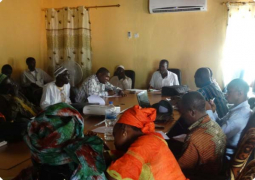
The GTU emphasised this essential aspect of human development at its 20th National Delegates Congress held on Thursday at the Paradise Suites Hotel under the theme: ‘Unite for Quality Education: Better Education for a Better World”.
The congress gave members of GTU the opportunity to critically examine the activities of the union since the past executive came to power in August 2009.
It also allowed members to identify areas where they have done well and those they need to improve upon; debate the key issues affecting education and education workers in The Gambia; receive recommendations and pass resolutions with regard to improving the services being provided for them.
They also elected the National Executive officers of the Union and renewed their common strategy to achieve quality education for all and to enhance their advocacy for teachers and other education workers.
“GTU has a major role in developing plans for sustainable successful education system which will promote equality and break the vicious circle of exclusion,” says the Union’s president Lamin K. Marong.
Mr Marong, who is also the Principal of Muslim Senior Secondary School, said the importance of the theme could never be overemphasized, as: “It is a campaign to ensure that universal, free quality education remains at the top of the political agenda for a sustainable future.”
The purpose, he added, is to call on inter-governmental agencies, governments and public education authorities everywhere to put in place the three essential elements of a quality education, which are “Universal and free access to quality teachers; modern teaching tools and resources, and supportive, safe and secure environments for teaching and learning”.
“Although the present challenges in the provision of quality education can be daunting, yet the future provides a window of hope and holds enormous promise for the future,” Mr Marong stated.
The GTU was founded on 9 February 1937 to carry out certain essential functions such as promoting means whereby the collective views, opinions and decisions of members affecting the interest of education in general and those of the teaching profession in particular can be expressed
It is also out to establish, promote and maintain a high standard of professional qualification, loyalty to established principles and unswerving devotion to the proper education of children.
The GTU, as a national union of teachers and (other) education workers, is so far the only representative of Education International (EI) in The Gambia, the Union’s statement says.
In his keynote address on the occasion, Dr Omar Jah JR, Deputy Vice Chancellor, Administrative and Financial affairs at the University of the Gambia, said education is a vehicle designed to create not only good citizens as advocated by the society-centred theoristsbut also to prepare good and resourcefulhuman beings.
“If properly designed education prepares particularlythe youth to take upleadership and other responsiblepositions in societythrough the acquisition of the relevant knowledgeand skills, attitudes and right valuesystems required to fosterself disciplinethat assures ussustained livelihood,” he said.
Dr Jah said education is not just a privilege or a right but a fundamental obligation, which shapes and molds great civilizations, for, while individuals are entitled to give up their rights and privileges, they are not entitled to do so in the case of their education.
“Educational values such as courtesy, consideration, and respect for oneself, respect for others and for authority are the foundations of a civilized society,” he added, saying that in today’s modern and post-modern complex world, every child should have access to quality education.
“Quality education rests on three pillars, namely: quality teachers, quality tools and quality environments,” he says, emphasizing the fact that all these need support to better the nation politically, culturally, economically, socially and other facets of life.
Dr Jah also says that teachers are the most important educational resource and a critical determinant of quality and therefore need an appropriate curriculum, learning materials and resources as well as safe and secure facilities to teach effectively.
More teachers, he notes, should be trained year in year out to address teacher attrition and maintain quality education.
He also says to address some of the challenges, such as teacher attrition, “we must offer adequate remuneration and possibilities for both horizontal and vertical career developments within the school system”.
The performance level of many African countries towards the attainment of the Education for All and the Millennium Development Goals remains bleak and uncertain, he notes, saying that many countries will not reach the Education for all goals and the Education Millennium Development Goals by the 2015 target date.
He said further: “There are tens of millions of children who are not in school and who live in poverty.Any economic policy that privatizes and reduces public investment in education will marginalize children and adults living in poverty while reducing the quality in public education.
“The Dakar Framework for Action, calling for the achievement of Education for All (EFA) goals by 2015, requires a great global effort, joining the forces of all governments, civil society including non-governmental organizations (NGOs) and Education Unions, and intergovernmental agencies, including the UN with its specialised agencies. Governments should implement the Delors Commission to allocate at least 6% of their GNP to education. Today the majority of the governments fail to achieve this level of investment.”
Dr Jah said some of the obstacles that have hindered access to quality education for all include the shortage of qualified teachers, poor infrastructure and resources and gender inequality.
He added that the GTU and all other stakeholders in education should intensify their advocacy roles in ensuring that all individuals are availed opportunities to continuous education at all levels and at any age without discrimination.
The UTG Vice Chancellor also applauded the Ministry of Basic and Secondary Education for “their unflinching support in general and their yearly provision of scholarships to deserving teachers to pursue various certificates and degrees at the University of The Gambia”.
In her statement on the occasion, GTU General Secretary Antoinette Corr Jack recalled also the plight of the schoolgirls in Chibok who are under the control of Boko Haram in Nigeria.
She said: “We will all recall that few months ago the Government Secondary School for Girls in Chibok, Bono State in Nigeria, had their school dormitory raided at night by a group of terrorists calling itself BOKO HARAM and abducted 238 girls.
“To date their exact whereabouts cannot be traced and the insurgents have claimed responsibility.
“This is a serious affront to human civilization and every effort should be made to BRING BACK OUR GIRLS.”
She also said: “It is important to note that already, close to 200 teachers have been killed in Bono and Yobe States and in some instances had their families also abducted.”




